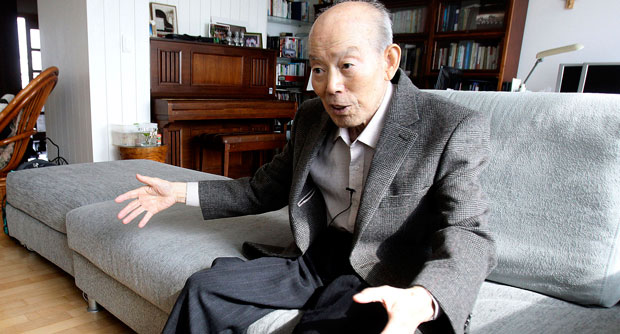
In this Feb. 14. 2014 photo, Kim Se-rin, 84, speaks during an interview at his house in Bucheon, South Korea. AP FILE PHOTO
BUCHEON – Kim Se-Rin always knew it would be impossible to get all the answers to more than 60 years’ worth of questions in just 12 hours.
But he got the ones he needed.
Kim, 85, was one of 82 elderly South Koreans who returned Saturday from a bittersweet, emotionally fraught reunion with North Korean relatives from whom they have been separated since the 1950-53 Korean War.
With tens of thousands of South Koreans wait-listed for one of the rare gatherings, Kim was all too aware of how lucky he was to be selected.
But the meeting with his younger sister, now 80, had still filled him with trepidation.
“There were just so many things I wanted and needed to know,” Kim said after his return in his daughter’s home in Bucheon, west of Seoul.
The first son of an affluent farming family in the North Korean county of Hwangju, he had left his hometown in December 1950 at the height of the Korean War to join the South Korean army.
That he went without telling his parents, his brother or his two sisters became a source of life-long guilt and regret that he hoped he could partly excise by meeting his sister.
Although the reunion in a North Korean mountain resort was tagged as a three-day event, the time officially allotted for the divided family members to meet totalled just 12 hours.
“I peppered her with questions,” Kim said. “About her life, when our parents passed away, about my younger brother…”
Pain, and propaganda
It was only at the time Kim was selected that he discovered for the first time his younger sister was now the only living member of his immediate family.
“She told me my brother went to medical school and worked in Pyongyang Central Hospital for a long time before he died.
“He was seven years younger than me. I feel so sad that he passed away before me,” he said.
Like many who crossed to the South, Kim often fretted over his family’s well-being, especially because, as landowners, they would have been likely targets for class struggle in the communist North.
“The most important thing for my father was to know what happened to the family during the war and how they lived for all those years afterwards,” said Kim’s daughter, Kim Young-Soon, who accompanied him to the reunion.
Their parents, Kim’s sister told him, had died during the war.
“She had photos and they talked a lot about their shared memories,” said Kim Young-Soon.
“It made my father happy and he was thankful that he had the chance for this meeting before he died. You have to understand, he’s 85 years old and it was his lifelong wish.”
Pooled media reports of the reunion in North Korea suggested that, for some participants, the event had failed to live up to their sky-high expectations.
Some complained that their North Korean relatives had spent valuable time parroting state propaganda on issues like the US troop presence in the South.
Rare, high-level negotiations between Seoul and Pyongyang had been required to prevent the North cancelling the reunion over South Korea’s refusal to postpone its annual military drills with the United States which began Monday.
‘First and last memory’
Kim Young-Soon said her aunt had stressed the key role of North Korean leader Kim Jong-Un in organising the reunion, but otherwise politics hadn’t overly tainted the meeting.
Her overriding memory was of a private moment in their hotel room, away from the glare of the TV cameras.
Her aunt had seemed uncomfortable and her feet were swollen, so her niece massaged them with ointment.
“She fell asleep so fast,” Kim recalled.
“She was nearly 80 years old and she must have been awfully tired. So I kept massaging her, holding her hands and touching her face while she slept.
“I wanted to touch her as much as I could, because that would be my first and last memory of my aunt.”
It was the first meeting of divided families in more than three years, as the reunion programme was suspended following the North’s shelling of a South Korean border island in 2010.
Cross-border ties are currently enjoying something of a thaw, but precedent suggests that such periods are often short-lived in what remains a highly volatile relationship.
When Kim Se-Rin said goodbye to his younger sister on Saturday, he knew it was, in all likelihood, their final farewell.
But he tried to make it a positive moment.
“I believe Korea will be unified one day. Nowadays, people can live up to 100 and my goal is 95,” he said.
“So I told my family in North Korea to think like that.”